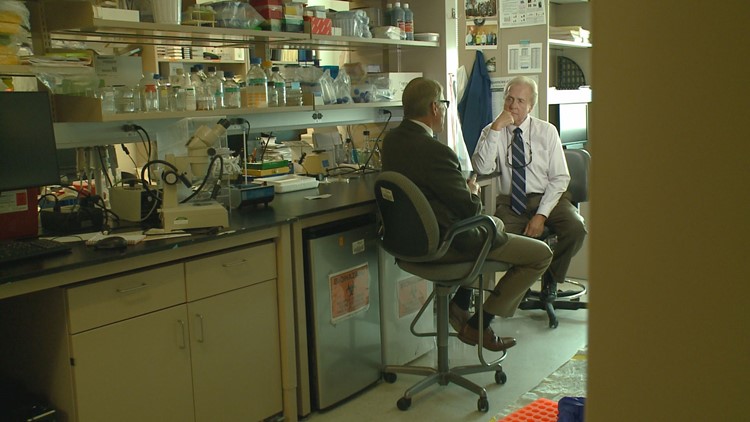Despite the fact that Alzheimer's research continues to be a graveyard for a large number of drugs formulated to cure it, researchers now generally agree that they are finally getting closer to a solution.
There are currently three drugs in trials that are showing great promise. You might call them the three horsemen that could end the apocalypse that is Alzheimer's.
9NEWS has done a lot of reporting about two of these drugs, Adacanumab and Leukine, both in various stages of research at the CU Anschutz Medical Center. Both so far are showing generally positive results.
The third and newest drug still doesn't have a name, it has a designation.
"BAN2401" comes from drug maker Biogen's Japanese partner Eisai. Their test of this drug in safety trials produced more good results.
Aducanumab and BAN2401 are referred to as "Amyloid Monoclonal Antibodies, "or drugs that attack the amyloid plaques in the brain believed to be a primary driver of Alzheimer's disease."
"The drugs are designed to remove the Amyloid protein from the brain, which we have good reason to believe is part of the pathology or what's going wrong with Alzheimer's," said Dr. Jonathan Woodcock, a Neurologist involved in Alzheimer Research at CU Anschutz
BAN2401, for its part, doesn't cure Alzheimer's. But it does give patients added years of cognition.
ALZHEIMER'S COVERAGE | 71,000 Coloradans are living with Alzheimer's | Resources, research and their stories
Woodcock said the drug essentially impedes the progression of the disease. "The study results showed that the decline we see in people with early Alzheimer's was slowed down," he said.
Woodcock said the 856 people who participated in the study didn't get better after taking the drug, but they never got worse either.
"And that's important because it allows people to function better for longer periods of time," he explained.
A couple of years in added cognition amounts to treatment savings into the trillions of dollars.
"If all the people who were alive today who would eventually get Alzheimer's disease could see the disease course slowed by just two years, the savings would be over $7 trillion dollars," Woodcock said.
The results of the test trials were impressive enough that Biogen and its partners are reportedly considering talking to regulators about a fast-track path to approval that would get the drug into the hands of consumers soon. But experts say that's a high hurdle.
"I think they have some other work to do before they're able to do that," said Woodcock. "They've got three different markets -- Japan, Europe and the United States -- and they each have their own fast-track mechanisms.
Still, all three drugs remain steadily on-pace in the research process, and there are also indications that the side effects that come with them may be relatively minor.
"They appear to occur in a minority of the study subjects, and they appear to be relatively mild. Some patients have more severe reactions with Aducanumab, but as we've seen more patients studied it looks like the drugs are pretty well tolerated," Woodcock said.
But with a new Alzheimer's diagnosis in the U.S. every 65 seconds, the million-dollar question remains: How much longer will families and patients have to wait for a drug for a disease that is the sixth-leading cause of death in the country, that still has no prevention, no treatment and no cure?
"I think in terms of the BAN2401 and the Aducanumab, we're probably looking at a timeframe of two to five years," Woodcock said.
Leukine could actually have a somewhat shorter timeline.
Woodcock said the drug has already been approved for other indications and has been in use for decades. It's available and in the routine manufacture, and it has been on the market since 1991 as a treatment for bone marrow cancer. It just needs to be further tested and approved for use for Alzheimer's disease, Woodcock said.
For most of us, that's an answer that after years of failure, provides at least a glimmer of hope where previously there was no hope at all.



